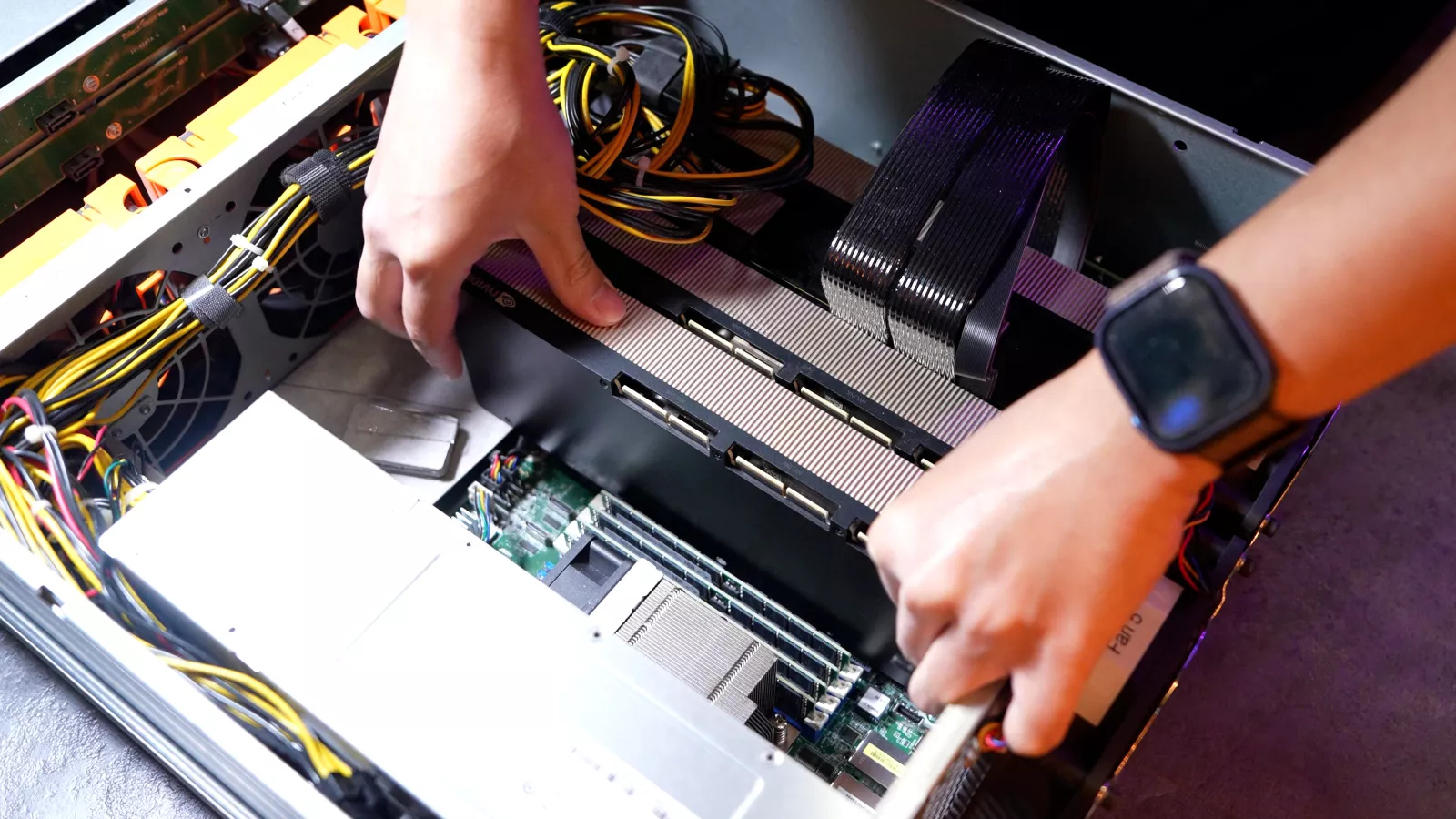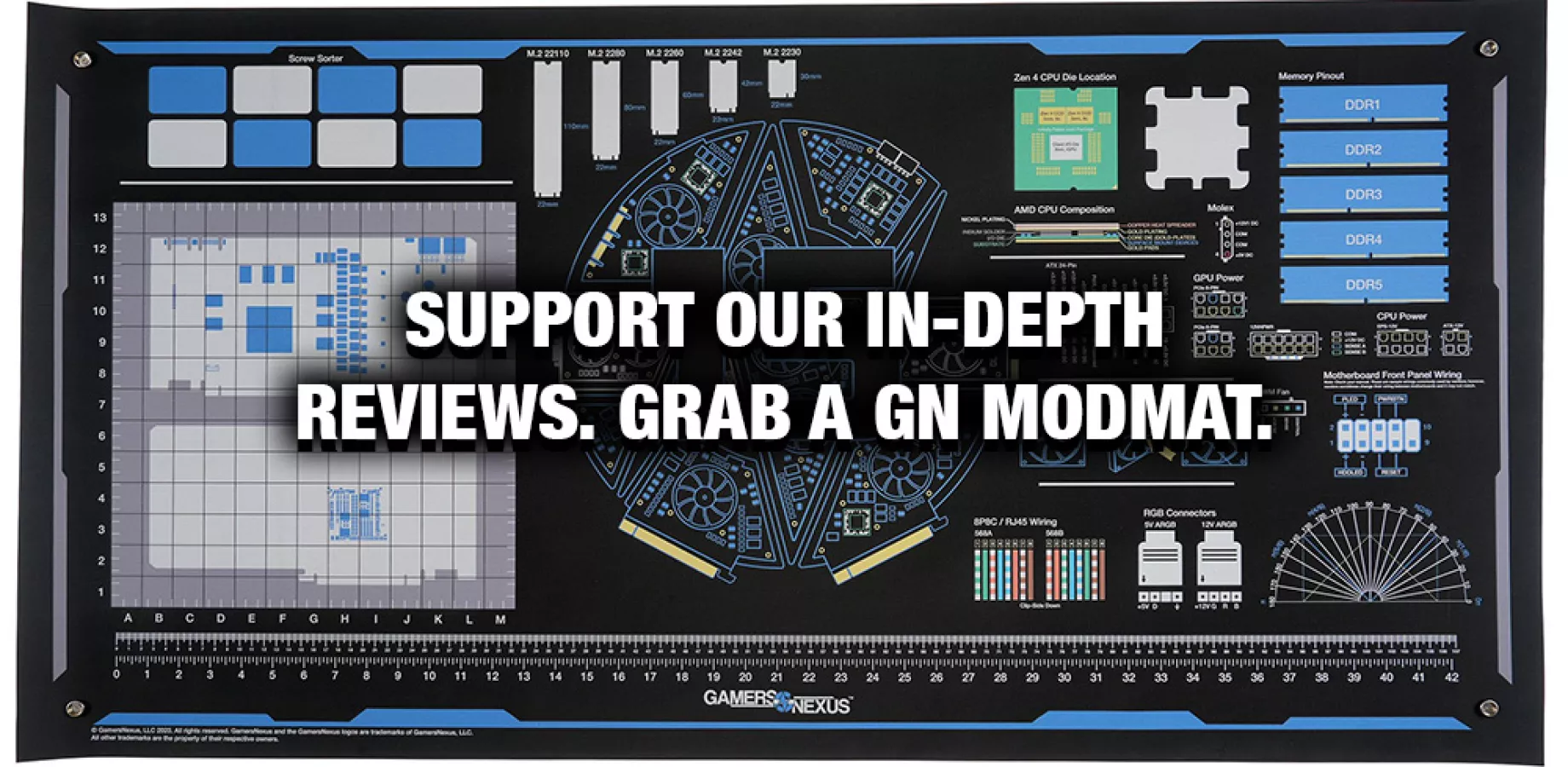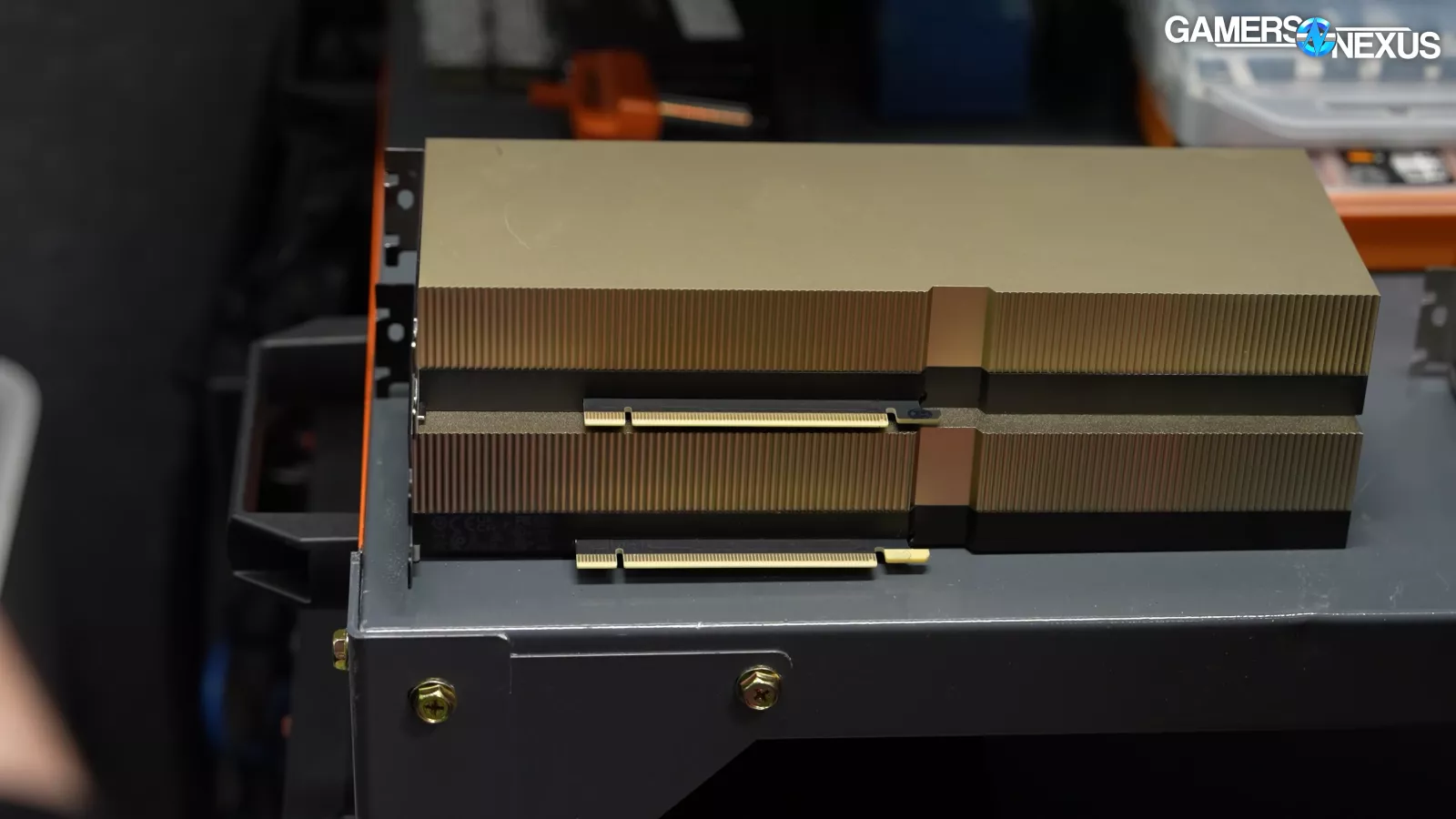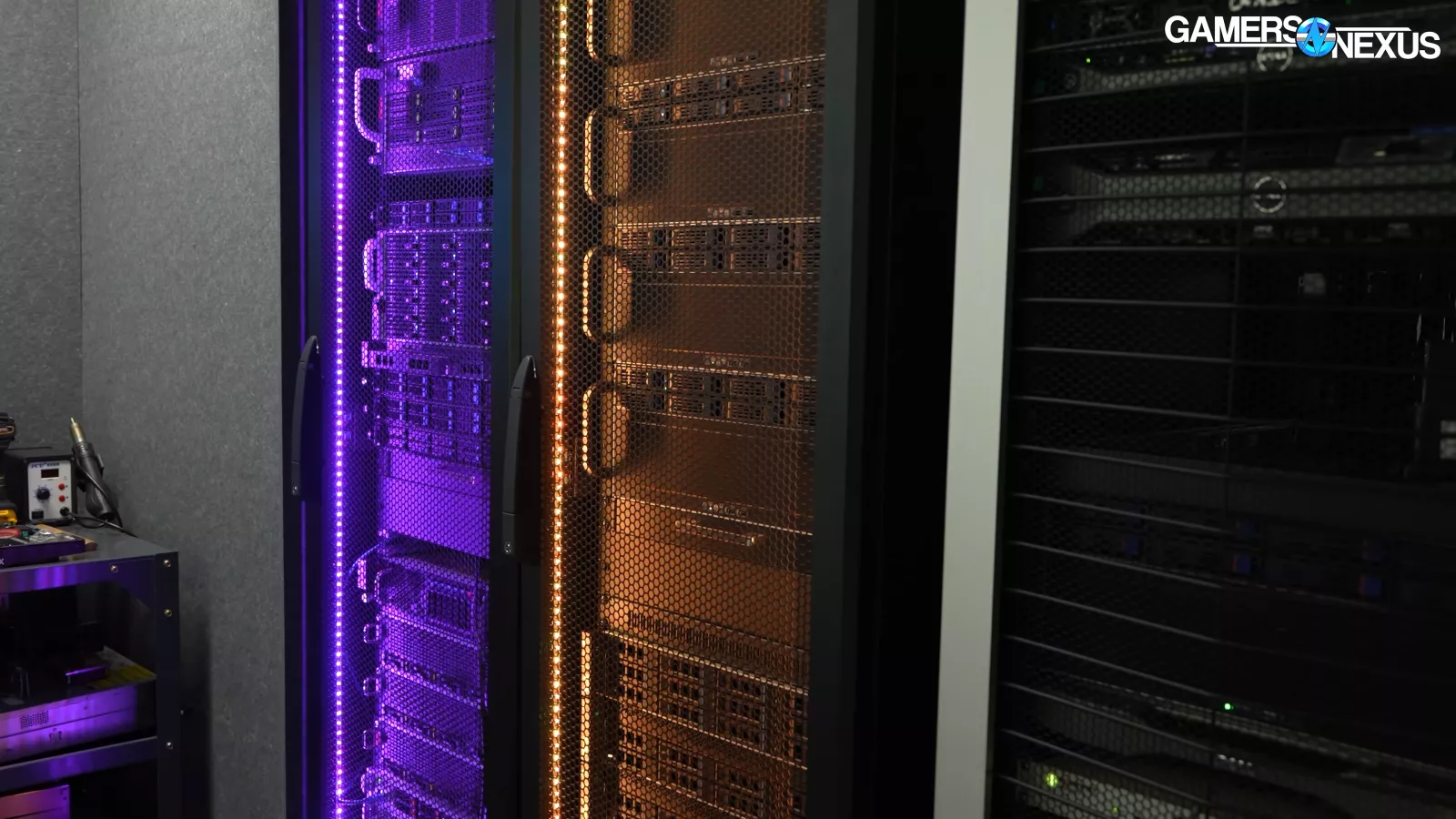
We’ve compiled a comprehensive timeline of the GPU bans, GPU smuggling, and export controls that impact NVIDIA, AMD, and Intel
The Highlights
- The US blocks exports of advanced GPUs to China to protect national security
- NVIDIA GPUs are highly sought after in China for AI processing
- Our timeline chronicles the US export controls, NVIDIA's responses, and reports of GPU smuggling

This is a comprehensive timeline of the GPU bans, smuggling, and export controls on NVIDIA, AMD, Intel, and other high-tech semiconductor products. We are publishing this as part of our stretch goals for Black Market AI GPU — a viewer-funded film made possible through support on our store, including our new “Blind Eye” T-shirt.
The below timeline accompanies our Black Market AI GPU investigation, our biggest project yet. We spent three weeks in Asia to uncover this story, including two weeks in China and one in Taiwan. We found smugglers, middlemen, and users of so-called “AI” GPUs that the United States government has banned for sale into China.
Credits
Host, Writing, Lead Editing
Steve Burke
Editing
Vitalii Makhnovets
Tim Phetdara
Editing, Graphics
Andrew Coleman
Camera
Tannen Williams
Research and Writing
Ben Benson
We are providing this timeline for free and without third-party ads for our viewers and readers. As this situation has changed frequently and now spans multiple US administrations, we may have missed a few events. However, we believe we have compiled all the major changes – especially since the start of 2025 – that are directly relevant to the story.
We have attempted to present it as neutrally as feasible and from a place of reporting. We’ve included links to a variety of media and government sources that we believe are appropriate for establishing the timeline of events. We have included statements from NVIDIA in many cases.
This was a huge team effort at GN and required a massive investment in travel, writing, research, and editing to complete. If you find this information valuable, we ask that you please support us directly by backing our NVIDIA AI GPU Black Market project, buying something from our GN store, or signing up for our Patreon. Thank you.
Timeline
Note on sources: Our intent is to cite primary sources, including government documents, and a variety of secondary sources. In some cases, we link only to secondary news stories. This can occur when we include articles from credible media reports but do not have primary documents to cite.
2018 GPU Export Controls
August 2018
August 13: The US government created the National Security Commission on Artificial Intelligence (NSCAI) as part of the John S. McCain National Defense Authorization Act for Fiscal Year 2019. The NSCAI had 15 commissioners who were nominated by Congress and the Executive Branch. The NSCAI was tasked with investigating how the United States should compete in AI in the modern age and recommending actions for Congress and the executive branch.
In the words of the original document, the commissioners “shall consider the methods and means necessary to advance the development of artificial intelligence, machine learning, and associated technologies by the United States to comprehensively address the national security and defense needs of the United States.”
- Source:
- National Defense Bill (NSCAI section starts on page 1963)
2019 GPU Export Controls
May 2019
May 15: Citing national security risks, the US government added Huawei to its Entity List and restricted sales of Huawei’s equipment into the United States.
- Sources:
- Federal Register
- Executive Order
- Politico: Trump signs order setting stage to ban Huawei from U.S.
- Reuters: Trump administration hits China's Huawei with one-two punch
- Reuters: China's Huawei, 70 affiliates placed on U.S. trade blacklist
2020 GPU Export Controls
May 2020
May 19: The United States restricted semiconductor designs, chipsets, and technologies to Huawei and its foreign affiliates.
- Sources:
- Department of Commerce Press Release
- Federal Register
- NPR: The Latest U.S. Blow To China's Huawei Could Knock Out Its Global 5G Plans
2021 GPU Export Controls
March 2021
The National Security Commission on Artificial Intelligence (NSCAI) released its final report. The report provided recommendations to “advance the development of artificial intelligence, machine learning, and associated technologies to comprehensively address the national security and defense needs of the United States.”
As part of the report (page 216), the NSCAI recommended the US government and its allies “utilize targeted export controls on high-end semiconductor manufacturing equipment… to protect existing technical advantages and slow the advancement of China’s semiconductor industry.”
Further on (page 228), the report said, “Looking across the AI stack, the hardware component of the AI stack contains the most viable targets for traditional export controls.” The report (page 231) focused on semiconductor manufacturing equipment for export control rules: “The primary U.S. export control target to constrain competitors’ AI capabilities should be sophisticated semiconductor manufacturing equipment (SME) necessary to manufacture high-end chips.”
The report mentioned export controls for GPUs (page 500) as a way “to prevent the use of
high-end U.S. AI chips in human rights violations.”
- Source:
- NSCAI Final Report – The PDF can be downloaded from here.
April 2021
NSCAI Commissioner Christopher Darby spoke at NVIDIA GTC about the NSCAI’s report to Congress.
- Source:
October 2021
October 1: The NSCAI officially ended on October 1, 2021.
- Source:
2022 GPU Export Controls
August 2022

August 31: NVIDIA filed a Form 8-K with the SEC to inform investors that the US government had immediately blocked exports of its A100 and H100 chips to China, including Hong Kong. The export controls included DGX or other systems that incorporate an A100, H100, or A100X. In the financial documents, NVIDIA said the US government informed it of the export restrictions on August 26, 2022. NVIDIA stated that its third-quarter results included up to $400 million in expected sales to China that were now uncertain due to the export restrictions.
September 2022
September 1: NVIDIA filed a new Form 8-K to let customers know that the US government had offered some exemptions for certain chip exports:
“The U.S. government has authorized exports, reexports, and in-country transfers needed to continue NVIDIA Corporation’s, or the Company’s, development of H100 integrated circuits after the Company filed its Current Report on Form 8-K with the U.S. Securities and Exchange Commission on August 31, 2022. The authorization also allows the Company to perform exports needed to provide support for U.S. customers of A100 through March 1, 2023. Additionally, the U.S. government authorized A100 and H100 order fulfillment and logistics through the Company’s Hong Kong facility through September 1, 2023.”
- Source:
Following NVIDIA’s SEC filing, media outlets reported the US government ordered NVIDIA to stop selling advanced AI chips to China.
- NVIDIA statement:
- “We are working with our customers in China to satisfy their planned or future purchases with alternative products and may seek licenses where replacements aren’t sufficient. The only current products that the new licensing requirement applies to are A100, H100 and systems such as DGX that include them.”– NVIDIA to CNBC
- Sources:
- CNBC: NVIDIA stock falls after U.S. government restricts chip sales to China
- The New York Times: U.S. Restricts Sales of Sophisticated Chips to China and Russia
- Reuters: U.S. officials order NVIDIA to halt sales of top AI chips to China
- CNN: US orders NVIDIA and AMD to stop selling AI chips to China
- Associated Press: China demands US drop tech export curbs after NVIDIA warning
October 2022
October 7: The Department of Commerce’s Bureau of Industry and Security (BIS) implemented a series of export controls to “protect US national security and foreign policy interests.” The new export controls would hinder China’s ability to build high-end semiconductors and purchase advanced chips from the US, including for development of and maintaining supercomputers.
- Sources:
- Department of Commerce Release
- Federal Register (amended on October 13)
In a briefing with reporters, the US government said the new regulations formalized the guidance previously sent to NVIDIA. The Guardian reported:
“The new regulations will also severely restrict export of US equipment to Chinese memory chip makers and formalize letters sent to NVIDIA Corp and Advanced Micro Devices Inc (AMD) restricting shipments to China of chips used in supercomputing systems that nations around the world rely on to develop nuclear weapons and other military technologies.”
- Sources:
- The Guardian: Biden administration imposes sweeping tech restrictions on China
- The New York Times: Biden Administration Clamps Down on China’s Access to Chip Technology
November 2022
November 7: Reuters reported that NVIDIA had created a new AI chip called the A800 GPU for the China market. The A800 would be compliant with US export controls.
- NVIDIA statement:
- “The NVIDIA A800 GPU, which went into production in Q3, is another alternative product to the NVIDIA A100 GPU for customers in China. The A800 meets the US government’s clear test for reduced export control and cannot be programmed to exceed it.” - NVIDIA to Reuters
- Sources:
- Reuters: Exclusive: NVIDIA offers new advanced chip for China that meets U.S. export controls
- Tom’s Hardware: NVIDIA Creates New Supercomputer Chip For Chinese Market
- The Verge: NVIDIA’s selling a nerfed GPU in China to get around export restrictions
- TechCrunch: NVIDIA touts a slower chip for China to avoid US ban
2023 GPU Export Controls
March 2023
March 21: Reuters reported that NVIDIA had modified the H100 to be compliant with export rules to China.
- NVIDIA’s statements to Reuters:
- “On Tuesday, the company said it has similarly developed a China-export version of its H100 chip. The new chip, called the H800, is being used by the cloud computing units of Chinese technology firms such as Alibaba Group Holding Ltd, Baidu Inc and Tencent Holdings Ltd, a company spokesperson said.” [...]
“The NVIDIA spokesperson declined to say how the China-focused H800 differs from the H100, except that ‘our 800 series products are fully compliant with export control regulations.’”
- Sources:
- Reuters: NVIDIA tweaks flagship H100 chip for export to China as H800
- Data Center Dynamics: NVIDIA creates pared back H100 GPU for export to China, called H800
June 2023
June 27: The Wall Street Journal reported that the US government is considering expanding export controls for GPUs and AI chips to China. The US Department of Commerce did not comment to the Wall Street Journal.
- Sources:
- The Wall Street Journal: U.S. Considers New Curbs on AI Chip Exports to China
- MarketWatch: White House says it’s focused on being at front end of supply chain for chips, won’t comment on report of possible new ban on exporting AI chips to China
- Reuters: US mulls new export restriction on computing power in AI chips
- TechCrunch: China’s AI firms might further lose chip access in new US ban
October 2023
October 17: The US Department of Commerce updated its export compliance for advanced semiconductors and semiconductor manufacturing equipment. The government said:
“Today’s rules reinforce the October 7, 2022, controls to restrict the PRC’s ability to both purchase and manufacture certain high-end chips critical for military advantage. These updates are necessary to maintain the effectiveness of these controls, close loopholes, and ensure they remain durable.”
The U.S. government has removed interconnect speed as a criterion for identifying restricted chips. Instead, it will now focus on processor performance and performance density. In a statement, the government said:
“A performance density parameter prevents the workaround of simply purchasing a larger number of smaller datacenter AI chips which, if combined, would be equally powerful as restricted chips.”
- Sources:
As part of the announcement, the administration told reporters the new restrictions affect NVIDIA’s A800 and H800 chips. A few days prior, Reuters reported that the administration would soon announce new export rules.
- Sources:
- Reuters: Exclusive: US tackles loopholes in curbs on AI chip exports to China
- CNBC: U.S. curbs export of more AI chips, including NVIDIA H800, to China
- Reuters: NVIDIA details advanced AI chips blocked by new export controls
- Tom’s Hardware: US Prohibits Exports of NVIDIA’s A800 and H800 to China, Blacklists Chinese GPU Developers
- The Verge: NVIDIA’s H800 AI chip for China is blocked by new export rules
October 23: NVIDIA filed a Form 8-K with the SEC that said the new export rules impact its A100, A800, H100, H800 and L40S chips. NVIDIA said it “does not anticipate that the accelerated timing of the licensing requirements will have a near-term meaningful
impact on its financial results.”
- Sources:
- NVIDIA Form 8-K
- BBC: US orders immediate halt to some AI chip exports to China, NVIDIA says
- Tom’s Hardware: US Govt Speeds Up Export Restrictions for NVIDIA’s GPUs
December 2023

December 6: In a meeting with reporters in Singapore, NVIDIA said that it was working on new chips that comply with the government’s rules.
- NVIDIA statement:
- “NVIDIA has been working very closely with the U.S. government to create products that comply with its regulations. Our plan now is to continue to work with the government to come up with a new set of products that comply with the new regulations that have certain limits.” – NVIDIA CEO Jensen Huang, as reported in Reuters
- Sources:
- Reuters: NVIDIA working closely with US to ensure new chips for China are compliant with curbs
- Reposted in CNBC
December 28: NVIDIA released a new version of RTX 4090 for the China market. The new chip, called the GeForce RTX 4090D, would be compliant with US export control restrictions.
- NVIDIA statements:
- “The GeForce RTX 4090 D has been designed to fully comply with U.S. government export controls. While developing this product, we extensively engaged with the U.S. government.” - NVIDIA to Reuters
- “In 4K gaming with ray tracing and deep-learning super sampling (DLSS), the GeForce RTX 4090D is about five percent slower than the GeForce RTX 4090 and it operates like every other GeForce GPU, which can be overclocked by end users.” – NVIDIA to The Register
- Sources:
- Reuters: NVIDIA launches new gaming chip for China to comply with US export controls
- The Register: NVIDIA slowed RTX 4090 GPU by 11 percent, to make it 100 percent legal for export to China
- The Verge: NVIDIA is releasing a slower RTX 4090 in China to comply with US restrictions
2024 GPU Export Controls
February 2024
February 1: Reuters reported that NVIDIA had prepared new GPUs for China, including the H20. Several sources told Reuters that the new offerings are less powerful than similar chips from Huawei.
- Sources:
- Reuters: Exclusive: NVIDIA’s new China-focused AI chip set to be sold at similar price to Huawei product
- Tom’s Hardware: New NVIDIA AI GPUs designed to get around U.S. export bans come to China — H20, L20, and L2 to fill void left by restricted models
July 2024
July 22: Reuters reported that NVIDIA is creating a new GPU for the China market based on its Blackwell chips. Sources told Reuters that the chip would be a version of the Blackwell B200. NVIDIA did not publicly disclose the specifications.
- Sources:
- Reuters: Exclusive: NVIDIA preparing version of new flagship AI chip for Chinese market
- Tom’s Hardware: NVIDIA preparing a China-focused variant of its B200 Blackwell AI GPU to comply with US export regulations
- HPCWire: NVIDIA Prepares New AI Chip for China Amid Ongoing US Export Controls
December 2024
December 2: The US government expanded rules that limit the export of high memory bandwidth (HBM) and advanced semiconductor equipment.
The Center for Strategic & International Studies explained the new rules on HBM:
“The December 2024 controls change that by adopting for the first time country-wide restrictions on the export of advanced HBM to China as well as an end-use and end-user controls on the sale of even less advanced versions of HBM. The goal of these controls is, unsurprisingly, to degrade China’s AI industry.” [...]
“Modern AI chips not only require a lot of memory capacity but also an extraordinary amount of memory bandwidth. Bandwidth refers to the amount of data a computer’s memory can transfer to the processor (or other components) in a given amount of time. With low-bandwidth memory, the processing power of the AI chip often sits around doing nothing while it waits for the necessary data to be retrieved from (or stored in) memory and brought to the processor’s computing resources.”
- Sources:
- Department of Commerce Document
- Federal Register
- Government Presentation
- Center for Strategic & International Studies: Understanding the Biden Administration’s Updated Export Controls
2025 GPU Export Controls
January 2025
January 13: The US government tightened its export controls by introducing national chip caps for many countries, except for 18 allies. The new restrictions would be called the AI Diffusion Rule. The rule would go into effect in May 2025.
- NVIDIA statement:
- “It makes no sense for the Biden White House to control everyday datacenter computers and technology that is already in gaming PCs worldwide, disguised as an anti-China move. The extreme ‘country cap’ policy will affect mainstream computers in countries around the world, doing nothing to promote national security but rather pushing the world to alternative technologies. AI is mainstream computing – ubiquitous and essential as electricity. This last-minute Biden Administration policy would be a legacy that will be criticized by U.S. industry and the global community. We would encourage President Biden to not preempt incoming President Trump by enacting a policy that will only harm the U.S. economy, set America back, and play into the hands of U.S. adversaries.” – Ned Finkle, Vice President of Government Affairs, NVIDIA, to Bloomberg (Twitter link)
- Sources:
- US Government Fact Sheet
- Federal Register
- Federal Register
- Bloomberg: Biden to Further Limit NVIDIA AI Chip Exports in Final Push
- Tom’s Hardware: NVIDIA and SIA fire back at US gov's new export restrictions on AI GPUs to China
February 2025

February 26: NVIDIA filed its 10-K annual report with the SEC. In the 10-K, NVIDIA revealed that Singapore was the second-largest geographical source of revenue in 2024, behind the United States. Taiwan was third, and China was fourth.
Within the report, NVIDIA said:
“Singapore represented 18% of fiscal year 2025 total revenue based upon customer billing location. Customers use Singapore to centralize invoicing while our products are almost always shipped elsewhere. Shipments to Singapore were less than 2% of fiscal year 2025 total revenue.”
- Source:
February 27: Speculation began about AI GPUs being smuggled from Singapore to China. In late February, authorities in Singapore arrested three people for fraud involving servers that may contain AI GPUs. Singapore’s government granted the three people bail a few weeks later.
NVIDIA declined to comment to CNBC.
- Sources:
- ChannelNewsAsia: 3 men charged with fraud, cases linked to alleged movement of Nvidia chips
- CNBC: NVIDIA’s unofficial exports to China face scrutiny after arrest of silicon smugglers in Singapore
- Tom’s Hardware: Singapore police bust major ring smuggling NVIDIA GPUs to China-based DeepSeek: Report
- TechCrunch: Singapore grants bail for NVIDIA chip smugglers in alleged $390M fraud
April 2025
April 9: NPR reported that the US government would not add export controls for the H20 chip after NVIDIA CEO Jensen Huang attended a dinner at Mar-A-Lago. The dinner reportedly cost $1 million per head. The outlet said it was unclear whether Jensen Huang met with US President Trump directly.
NVIDIA declined to comment to NPR.
- Sources:
- NPR: Trump administration backs off NVIDIA H20 chip crackdown after Mar-a-Lago dinner
April 15: In a SEC filing, NVIDIA said the US government sent the company new export rules on April 9. According to NVIDIA, the H20 and all chips with the H20’s memory bandwidth or interconnect bandwidth will now need licenses to export to China. NVIDIA said the new rules would cost the company $5.5 billion in charges due to current H20 chip inventory and prior sales. NVIDIA declined to comment further to the BBC.
- Sources:
- NVIDIA Form 8-K
- BBC: NVIDIA shares plunge amid $5.5bn hit over export rules to China
- NPR: NVIDIA discloses that U.S. will limit sales of advanced chips to China after all
- Reuters: US issues export licensing requirements for NVIDIA, AMD chips to China
April 16: The US government released an investigative report on DeepSeek and requested information from NVIDIA about its AI GPUs. Through a letter sent to NVIDIA CEO Jensen Huang, the US government asked NVIDIA for a list of its customers in China and many countries in Asia, including Singapore. The government requested all communication between NVIDIA and DeepSeek.
The US Department of Commerce confirmed that it has issued new export control rules for AI chips. The Commerce Department provided a statement to The Wall Street Journal:
“The Commerce Department is issuing new export licensing requirements on the NVIDIA H20, AMD MI308, and their equivalents.”
- Sources:
- The Wall Street Journal: U.S. Confirms New Export Curbs on NVIDIA and AMD Chips
April 28: The Wall Street Journal reported that Huawei is expected to release its new AI chip, the Ascend 910D, soon. According to the Wall Street Journal’s sources, Huawei expects the Ascend 910D to be about as powerful as an NVIDIA H100.
- Sources:
- The Wall Street Journal: China’s Huawei Develops New AI Chip, Seeking to Match NVIDIA
- NetworkWorld: Huawei steps up AI chip race with Ascend 910D, targeting NVIDIA’s high ground
April 30: Anthropic, an AI startup backed by Amazon, called on the US government to increase export control restrictions to China. As part of a blog post, Anthropic said the government needs to improve its export enforcement to reduce smuggling. The company cited examples of chips being smuggled with “prosthetic baby bumps” and “live lobsters.”
In a response, NVIDIA said:
“American firms should focus on innovation and rise to the challenge, rather than tell tall tales that large, heavy, and sensitive electronics are somehow smuggled in ‘baby bumps’ or ‘alongside live lobsters.’” – NVIDIA to CNBC
- Sources:
- Anthropic blog post
- CNBC: NVIDIA says Anthropic is telling ‘tall tales’ in its defense of U.S. AI chip restrictions on China
- Tom’s Hardware: Despite NVIDIA claims, Chinese smugglers have used live lobsters and fake baby bumps to traffic chips
- Hong Kong Customs release
- China Customs release
May 2025
May 1: Jensen Huang spoke with the House Foreign Affairs Committee to discuss domestic manufacturing and the importance of AI. NVIDIA posted the remarks online.
- Sources:
- NVIDIA Newsroom Twitter Post
- Tom’s Hardware: NVIDIA warns U.S. AI hardware export rules could backfire, empowering Huawei to define global standards
May 7: Following a report in Bloomberg, the US Department of Commerce confirmed that it will not implement the AI Diffusion Rule that was created during the prior administration. The rule would have gone into effect on May 15, 2025.
The Department of Commerce released a statement to CNBC:
“The Biden AI rule is overly complex, overly bureaucratic, and would stymie American innovation. We will be replacing it with a much simpler rule that unleashes American innovation and ensures American AI dominance.”
NVIDIA released a statement:
“We welcome the Administration’s leadership and new direction on AI policy. With the AI Diffusion Rule revoked, America will have a once-in-a-generation opportunity to lead the next industrial revolution and create high-paying U.S. jobs, build new U.S.-supplied infrastructure, and alleviate the trade deficit.”
- Sources:
- Bloomberg: Trump to Rescind Global Chip Curbs, Prep New AI Restrictions
- Tom’s Hardware: NVIDIA celebrates dumping of Biden-era AI chip export rules — simpler new policy promised
- CNBC: Trump administration set to end Biden’s U.S. chip export restrictions
- NVIDIA Twitter Account
May 9: Reuters reported that NVIDIA is preparing a cut down version of the H20 for the Chinese market. Reuters sources said the chip would be ready in July. NVIDIA declined to comment.
- Sources:
- Reuters: Exclusive: NVIDIA modifies H20 chip for China to overcome US export controls, sources say
- Tom’s Hardware: NVIDIA readies cut-down HGX H20 GPU for China to comply with export control rules
May 13: The US government formally rescinded the previous administration’s AI Diffusion Rule, which was announced in January 2025. The government also announced actions to strengthen export controls for AI chips, including restrictions on using several Huawei Ascend chips
NVIDIA declined to comment to CNBC on the new export restrictions.
- Sources:
- US government press release
- BIS policy statement
- US government guidance on using Huawei Ascend chips
- The Register: Trump ends Biden-era dream to cap US AI chip exports
- Bloomberg: US Warns That Using Huawei AI Chip ‘Anywhere’ Breaks Its Rules
- Tom’s Hardware: U.S. issues worldwide crackdown on using Huawei Ascend chips, says it violates export controls
- CNBC: Trump administration’s next wave of China AI chip export rules are yet another obstacle for NVIDIA
May 15: A bipartisan group of legislators introduced the Chip Security Act that is intended to stop smuggling of high-end AI chips.
The Hill summarized the proposed legislation: “The legislation, titled the Chips Security Act, would require companies to ensure the location-verification abilities of their high-end AI chips and to report when a product has been diverted or changed location. It follows recent reports of increased smuggling of chips, including those made by NVIDIA, into China despite tight export controls.”
NVIDIA declined to comment to The Register.
- Sources:
- Chip Security Act text
- The Hill: Bipartisan House lawmakers propose bill to ‘stop smuggling’ of AI chips
- Reuters: U.S. lawmakers introduce bill to address AI chip smuggling
- The Register: Plan to keep advanced chips from China with tracking tech gains support in Congress
May 16: The Financial Times reported that NVIDIA intends to create a research and design center in Shanghai.
- NVIDIA statement:
- “We are not sending any GPU designs to China to be modified to comply with export controls.” - NVIDIA to CNBC
- Sources:
- Financial Times: NVIDIA plans Shanghai research centre in new commitment to China
- CNBC: NVIDIA says it is not sending GPU designs to China after reports of new Shanghai operation
May 19: NVIDIA CEO Jensen Huang told Bloomberg in a TV interview that he didn’t see any “evidence” of any AI chip diversion. Tom’s Hardware summarized Jensen Huang’s quote:
“Governments understand that diversion is not allowed, and there’s no evidence of any AI chip diversion — recognize our data center GPUs are massive; these are massive systems. The Grace Blackwell system is nearly two tons, and so you’re not going to be shipping — you’re not going to be putting that in your pocket or your backpack anytime soon. And so, these systems are fairly easy to keep track of... but the important thing is that the countries and the companies that we sell to recognize that diversion is not allowed, and everybody would like to continue to buy NVIDIA technology, and so they very well monitor themselves very carefully and they’re quite careful about that.”
- Sources:
- Bloomberg: NVIDIA CEO Says ‘No Evidence of Any AI Chip Diversion’
- Tom’s Hardware: NVIDIA CEO Jensen Huang says ‘There’s no evidence of any AI chip diversion’
May 21: At Computex 2025, NVIDIA CEO Jensen Huang called the US export controls a “failure.” He said that NVIDIA’s market share in China has dropped from 95% to 50% due to the restrictions. The Guardian quoted Jensen Huang as saying:
“The local companies are very, very talented and very determined, and the export control gave them the spirit, the energy and the government support to accelerate their development.” [...]
“I think, all in all, the export control was a failure.” [...]
“China has a vibrant technology ecosystem, and it’s very important to realise that China has 50% of the world’s AI researchers, and China is incredibly good at software.”
- Sources:
- CNBC: Jensen Huang says U.S. chip restrictions have cut NVIDIA’s China market share nearly in half
- The Guardian: US chip export controls are a ‘failure’ because they spur Chinese development, NVIDIA boss says
- The New York Times: NVIDIA’s Chief Says U.S. Chip Controls on China Have Backfired
May 27: Reuters reported that NVIDIA plans to launch a new, cheaper Blackwell-based GPU for the China market to comply with US export rules.
- NVIDIA statement:
- "Until we settle on a new product design and receive approval from the U.S. government, we are effectively foreclosed from China's $50 billion data center market." - NVIDIA to Reuters
- Sources:
- Reuters: Exclusive: NVIDIA to launch cheaper Blackwell AI chip for China after US export curbs, sources say
- SiliconANGLE: Report: NVIDIA racing to develop new, scaled-down Blackwell GPUs for China
May 28: During NVIDIA’s quarterly earnings, CEO Jensen Huang said the company was writing off unsold H20 inventory due to export controls. VentureBeat posted Jensen Huang’s quote from earnings:
“Let me share my perspective on some topics we’re frequently asked on export control. China is one of the world’s largest AI markets and a springboard to global success with half of the world’s AI researchers based there. The platform that wins China is positioned to lead globally today. However, the $50 billion China market is effectively closed to U.S. industry. The H20 export ban ended our Hopper data center business in China. We cannot produce Hopper further to comply. As a result, we are taking a multibillion-dollar write-off on inventory that cannot be sold or repurposed. We are exploring limited ways to compete, but hopper is no longer an option.”
- Sources:
- VentureBeat: NVIDIA CEO takes a shot at U.S. policy cutting off AI chip sales to China
- PC Gamer: NVIDIA’s Hopper GPUs are now dead to the Chinese market after export controls that made the company take a 'multibillion-dollar write-off'
June 2025

June 12: NVIDIA’s CEO Jensen Huang told CNN the company will no longer include sales and revenue from China in its forecasts. In a response to a question from CNN about whether the US government would lift its export controls, Jensen Huang said:
“I’m not counting on it but, if it happens, then it will be a great bonus. I’ve told all of our investors and shareholders that, going forward, our forecasts will not include the China market.”
- Sources:
- CNN: NVIDIA will stop including China in its forecasts amid US chip export controls, CEO says
June 18: Several media reported on rumors about NVIDIA preparing to launch a “RTX 5090 DD” for the China market. The new card would allegedly reduce the memory specifications compared to the RTX 5090D.
- Sources:
- Tom’s Hardware: NVIDIA planning new RTX 5090 'DD' variant for China — 24GB card with tweaked GPU latest attempt to comply with strict export restrictions
- WCCFTech: NVIDIA Preps GeForce RTX 5090 DD For China As Export-Compliant Model, Reportedly Features Blackwell GB202-240 GPU
June 23: Reuters reported that DeepSeek is supporting China’s military and intelligence operations, based on an interview with a senior US State Department official. The official said DeepSeek was using “shell companies” in Southeast Asia to circumvent export restrictions.
Reuters included comments from NVIDIA:
“‘We do not support parties that have violated U.S. export controls or are on the U.S. entity lists,’ an NVIDIA spokesman said in a prepared statement, adding that ‘with the current export controls, we are effectively out of the China data center market, which is now served only by competitors such as Huawei.’” [...]
“‘Our review indicates that DeepSeek used lawfully acquired H800 products, not H100,’ an NVIDIA spokesman said, responding to a Reuters query about DeepSeek's alleged usage of H100 chips.”
DeepSeek did not respond to an inquiry from Reuters.
- Sources:
- Reuters: Exclusive: DeepSeek aids China's military and evaded export controls, US official says
- Asia Times: DeepSeek gets NVIDIA’s high-end GPUs via Singapore: US official
June 26: The Information reported that DeepSeek’s next AI model has been delayed due to a shortage of NVIDIA AI GPUs in China.
- Sources:
- The Information: DeepSeek’s Progress Stalled by U.S. Export Controls
- Tom’s Hardware: AI disruptor DeepSeek's next-gen model delayed by NVIDIA GPU export restrictions to China — short supply of AI GPUs hinders development
July 2025
July 4: Bloomberg reported the US Department of Commerce is preparing a new export controls rule that would restrict the export of AI chips to Malaysia and Thailand. The rule’s goal would be to reduce AI chip smuggling to China. Based on its sources, Bloomberg said the export controls rule had not yet been finalized.
- Sources:
- Bloomberg: US Plans AI Chip Curbs on Malaysia, Thailand Over China Concerns
July 10: Bloomberg reported that NVIDIA CEO Jensen Huang met with US President Donald Trump at the White House before traveling overseas to China. NVIDIA did not immediately respond to a request for comment from Reuters.
- Sources:
July 11: In a public letter, a bipartisan group of US senators requested NVIDIA CEO Jensen Huang to avoid meeting with Chinese companies in an upcoming China trip that violate US laws or develop military applications that could undermine national security.
Reuters included a response from NVIDIA about the senators’ letter:
“An NVIDIA spokesperson said, ‘American wins’ when its technology sets ‘the global standard,’ and that China has one of the largest bodies of software developers in the world. AI software ‘should run best on the U.S. technology stack, encouraging nations worldwide to choose America,’ the spokesperson said.”
- Sources:
- United States Senate letter to Jensen Huang
- The Hill: Bipartisan senators press NVIDIA CEO over China trip
- Reuters: US senators warn NVIDIA CEO about upcoming China trip
- International Business Times: NVIDIA CEO Huang to Face Chinese Officials Over AI Export Curbs Just as Company Touches $4 Trillion Milestone
July 14: NVIDIA said it would soon resume sales of the H20 for customers in China. NVIDIA provided the following update in a blog post:
“[Jensen] Huang also provided an update to customers, noting that NVIDIA is filing applications to sell the NVIDIA H20 GPU again. The U.S. government has assured NVIDIA that licenses will be granted, and NVIDIA hopes to start deliveries soon.”
The White House did not respond to a request for comment from CNN.
- Sources:
- NVIDIA Blog: NVIDIA CEO Jensen Huang Promotes AI in Washington, DC and China
- CNN: NVIDIA says it will restart sales of a key AI chip to China, in a reversal of US restrictions
- Reuters: Chinese firms rush to buy NVIDIA AI chips as sales set to resume
- Associated Press: NVIDIA to resume sales of highly desired AI computer chips to China
The Malaysian government began requiring trade permits for all high-performance AI chips acquired from the United States. In a statement, the Malaysian government said:
“The Ministry of Investment, Trade and Industry (MITI) would like to announce that, effective immediately, all exports, tranships and transits of high-performance AI chips of US origin are subject to a Strategic Trade Permit. These powers are provided for under Section 12 of the Strategic Trade Act 2010 (STA 2010), a Catch-All Control provision which requires individuals or companies to notify the relevant authority at least 30 days before exporting, transhipping, or bringing in transit any item not expressly listed in the Strategic Items List (SIL), if the individual or company knows or have reasonable grounds to suspect the item will be misused, or used for a restricted activity.
This initiative serves to close regulatory gaps while Malaysia undertakes further review on the inclusion of high-performance AI chips of US origin into the SIL of the STA 2010. Malaysia stands firm against any attempt to circumvent export controls or engage in illicit trade activities by any individual or company, who will face strict legal action if found violating the STA 2010 or related laws.”
- Sources:
- Malaysia Government Release
- Reuters: Malaysia says trade permit required for AI chips of U.S. origin
- Bloomberg: Malaysia Controls AI Chip Exports As US Targets China Smuggling
July 15: DigiTimes reported that NVIDIA is preparing a new AI GPU for the China market, the RTX 6000D. DigiTimes claimed the card would become available in the third quarter of 2025, according to its sources in the supply chain.
- Sources:
- DigiTimes: Exclusive: Jensen Huang's third visit to China in 2025; RTX 6000D aims for two million shipments
- Tom’s Hardware: NVIDIA reportedly preparing RTX 6000D for Chinese market to comply with U.S. export controls — fabricated on TSMC N4, featuring GDDR7 memory capable of delivering 1,100 GB/s of bidirectional bandwidth
July 24: The Financial Times reported that more than $1B worth of NVIDIA’s AI chips had been smuggled to China. In response, NVIDIA said that building datacenters with “smuggled products” was a “losing proposition.”
- NVIDIA statement:
- “Trying to cobble together datacenters from smuggled products is a losing proposition, both technically and economically. Datacenters require service and support, which we provide only to authorized NVIDIA products.” - NVIDIA to CNBC
- Sources:
- Financial Times: NVIDIA AI chips worth $1bn smuggled to China after Trump export controls
- CNBC: NVIDIA addresses AI chip smuggling, says bootleg data centers are a ‘losing proposition’
July 28: The Financial Times reported that the US Commerce Department was not going to make “tough moves” to tighten export controls to China. According to the report, the US government would try to secure a better trade deal with China ahead of negotiations in Stockholm.
The Washington Post reported that several congressional members had warned the US administration against loosening its export controls for AI GPUs. NVIDIA and the US Commerce Department did reply to requests for comment to The Washington Post.
Several national security experts voiced their concern by sending a letter to the US Commerce Department.
- Sources:
- Financial Times: Donald Trump freezes export controls to secure trade deal with China
- The Washington Post: Trump’s retreat on China chip ban triggers policy spat
- Tom’s Hardware: Trump freeze on export restrictions to China reportedly in aid of trade talks — White House seeking face-to-face with Xi Jinping as dissenters warn H20 reversal is a dangerous mis-step
July 29: Reuters reported that NVIDIA had ordered 300,000 more H20 chips from TSMC due to strong demand from its customers in China. Several weeks prior, NVIDIA said it would resume sales of the H20 chip to China.
NVIDIA declined to comment to Reuters.
- Sources:
- Hot Hardware: TSMC Secures 300,000 H20 AI Chip Order As NVIDIA Boosts Supply To China
July 31: The New York Times reported that Chinese government officials asked NVIDIA for information about security risks associated with its H20 chip. NVIDIA denied having “backdoors” in its chips.
- NVIDIA statement:
- “Cybersecurity is critically important to us. NVIDIA does not have ‘backdoors’ in our chips that would give anyone a remote way to access or control them.” - NVIDIA to CNBC
- Sources:
- The New York Times: China Summons NVIDIA Over ‘Backdoor Security’ Risks of A.I. Chips
- CNBC: NVIDIA denies its China-bound H20 AI chips have ‘backdoors’ after Beijing’s security concerns
- Reuters: NVIDIA says its chips have no 'backdoors' after China flags H20 security concerns
- Associated Press: China summons NVIDIA over ‘backdoor safety risks’ in H20 chips
August 2025

August 4: A government official told Bloomberg the United States is exploring adding location trackers for AI chips. Bloomberg quoted the official as saying, “There is discussion about potentially the types of software or physical changes you could make to the chips themselves to do better location-tracking.”
- Sources:
- Bloomberg: US Explores Location Trackers for AI Chips, Official Says
- The Register: Uncle Sam floats tracking tech to keep AI chips out of China
August 5: In a blog post, NVIDIA said that its GPU products do not have backdoors or kill switches.
- Sources:
- NVIDIA Blog: No Backdoors. No Kill Switches. No Spyware.
- CNBC: NVIDIA says its AI chips don’t have a ‘kill switch’ after Chinese accusation
The US Department of Justice announced it had arrested two people in California for smuggling high-end GPUs to China that purportedly amount to “tens of millions of dollars’ worth of sensitive microchips used in artificial intelligence (AI) applications.” The BBC reported that court documents say the shipments included the NVIDIA H100 and RTX 4090.
- NVIDIA statement:
- “This case demonstrates that smuggling is a nonstarter. We primarily sell our products to well-known partners, including OEMs, who help us ensure that all sales comply with U.S. export control rules. Even relatively small exporters and shipments are subject to thorough review and scrutiny, and any diverted products would have no service, support, or updates.” - NVIDIA to TechCrunch
- Sources:
- Department of Justice release
- Bloomberg: US Charges Chinese Nationals With NVIDIA Chips Export Breach
- Reuters: Two Chinese nationals in California accused of illegally shipping NVIDIA AI chips to China
- New York Post: Chinese nationals living in US charged with smuggling millions worth of NVIDIA’s powerful AI chips to Beijing
- TechCrunch: Two arrested for smuggling AI chips to China; NVIDIA says no to kill switches
- BBC: Chinese nationals charged with exporting NVIDIA AI chips to China
August 10: The Financial Times reported that NVIDIA would give the US government 15% of its revenue from H20 chip sales from customers in China. The deal is reportedly part of an agreement that would allow NVIDIA to acquire export licenses from the Commerce Department in order to sell the H20 chip in China. AMD would be subject to the same rules for the MI308.
- NVIDIA statement:
- “We follow rules the U.S. government sets for our participation in worldwide markets. While we haven’t shipped H20 to China for months, we hope export control rules will let America compete in China and worldwide. America cannot repeat 5G and lose telecommunication leadership. America’s AI tech stack can be the world’s standard if we race.” - NVIDIA to the Associated Press
- Sources:
- Financial Times: NVIDIA and AMD to pay 15% of China chip sale revenues to US government
- The Associated Press: NVIDIA and AMD to pay 15% of China chip sale revenue to US government in an unusual agreement
- The New York Times: U.S. Government to Take Cut of NVIDIA and AMD A.I. Chip Sales to China
- BBC: NVIDIA and AMD to pay 15% of China chip sales to US
August 11: According to a report in Bloomberg, US President Trump said he was open to allowing NVIDIA to sell a modified Blackwell chip for the China market. The US President also said that he has negotiated with NVIDIA CEO Jensen Huang about the deal to allow H20 sales in China.
- Sources:
- Bloomberg: Trump Open to NVIDIA Selling Scaled-Back Blackwell Chip to China
- The Register: Trump seeing green as he weighs deal to allow NVIDIA Blackwell GPU sales to China
- NPR: Trump says NVIDIA will hand the U.S. 15% of its H20 chip sales to China
- Reuters: Trump opens door to sales of version of NVIDIA’s next-gen AI chips in China
- Repost in MSN
August 12: Bloomberg reported that Chinese officials had “urged local companies” to avoid purchasing and using NVIDIA’s H20 chip, especially for national security and government work. According to Bloomberg, China questioned companies whether they had found security problems with NVIDIA’s chips.
Bloomberg included commentary from NVIDIA:
“AMD declined to comment, while NVIDIA said in a statement that ‘the H20 is not a military product or for government infrastructure.’ China has ample supplies of domestic chips, NVIDIA said, and ‘won’t and never has relied on American chips for government operations.’
- Sources:
CNBC reported that the Trump Administration was still working on the details for how to implement the 15% export tax on NVIDIA and AMD for selling certain chips to China.
- NVIDIA statement:
- “We follow rules the U.S. government sets for our participation in worldwide markets.” - NVIDIA to CNBC
- Sources:
- CNBC: White House says it’s working out legality of NVIDIA and AMD China chip deals
- Tom’s Hardware: White House confirms it's still figuring out the legality of the revenue-sharing NVIDIA and AMD deal for China GPU sales — 'The legality of it, the mechanics of it, is still being ironed out'
August 13: Reuters reported that US officials have covertly placed “location-tracking devices” in targeted shipments with advanced chips in an effort to catch chip smuggling to China. Unnamed sources told Reuters that the tracking devices had been placed in shipments of OEM servers, including from Dell and Supermicro.
NVIDIA declined to comment to Reuters.
- Sources:
- Reuters: Exclusive: US embeds trackers in AI chip shipments to catch diversions to China, sources say
- Tom’s Hardware: U.S. authorities allegedly placed secret tracking devices in AI chip shipments to China — report claims targeted shipments from Dell and Super Micro containing NVIDIA and AMD chips had trackers in packaging and servers themselves
TweakTown: US authorities secretly place location tracking devices in targeted AI chip shipments to China


